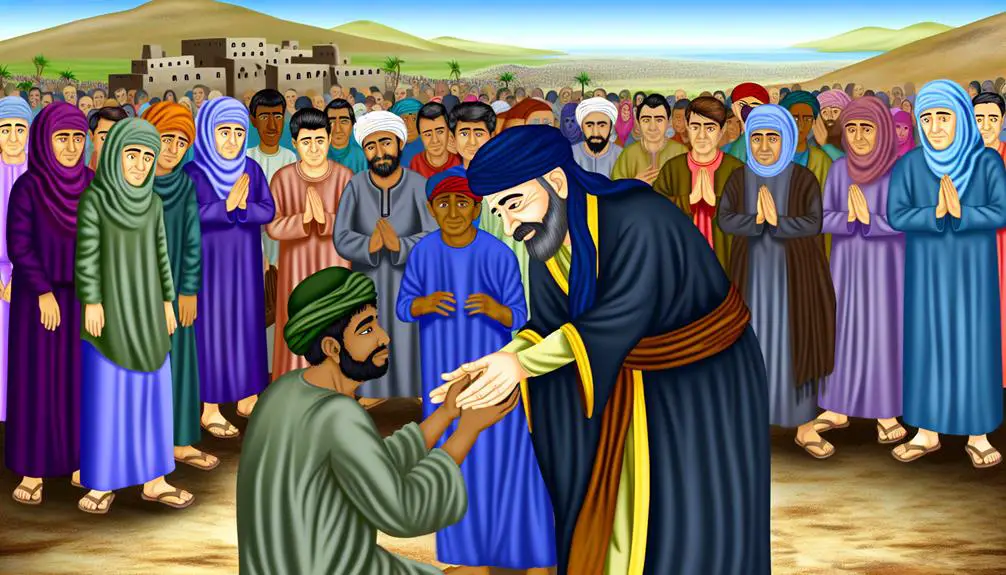Witness Jairus's leap of faith as a synagogue leader, showcasing a profound narrative of hope, despair, and divine intervention.

Meaning of Jairus in the Bible
Jairus's desperate plea to Jesus paints a poignant picture of profound faith and parental love. As you explore the biblical story of Jairus, you'll find a narrative that not only delves into the depths of despair but also demonstrates the heights of hope.
He wasn't just any man; his role as a synagogue leader adds layers of complexity to his request for Jesus to heal his dying daughter. This account isn't merely a miracle story; it's a testament to faith transcending societal boundaries and expectations.
The implications for modern faith are vast, urging you to consider how desperation can lead to divine intervention. What lessons can we draw from Jairus's humility and compassion?
Key Takeaways
- Jairus represents faith's power to transcend societal norms and cultural constraints in seeking divine intervention.
- His story illustrates the virtues of humility and compassion, even in positions of authority and respect.
- The healing of Jairus's daughter showcases the boundless possibilities of faith and divine grace beyond human limitations.
- Jairus's approach to Jesus emphasizes the importance of vulnerability and trust in spiritual journeys, challenging modern believers to reflect on their faith.
Jairus's Identity and Role

In the New Testament of the Bible, Jairus emerges as a prominent figure, serving as a synagogue leader who seeks Jesus' help to heal his dying daughter. His profession isn't merely a title but a testament to his influential status within the community, indicating his deep-rooted connections to the religious and social fabric of his time. As a synagogue leader, Jairus's role would have entailed overseeing the synagogue's functions, teaching, and possibly interpreting the Torah for the community. This position underscores his respectability and authority, painting a picture of a man deeply entrenched in the religious life of his people.
Jairus's family background, though not extensively detailed in the scriptures, plays a crucial role in understanding his desperate act of faith. It's implied that he's a family man, with at least one daughter whose illness prompts his plea to Jesus. This aspect of his life illuminates the personal stakes involved, transcending his public persona to reveal a devoted father. The intersection of Jairus's professional standing and his family situation provides a compelling insight into his character, showcasing the lengths to which he'd go to save his loved one, despite the potential risks to his reputation within the religious community.
The Desperate Plea to Jesus
In approaching Jesus, Jairus breaks societal norms, highlighting his desperation and humility. His request for Jesus to heal his dying daughter not only underscores his faith but also sets the stage for a discussion on the miraculous.
Analyzing this interaction sheds light on the dynamics of faith, power, and divine intervention in the biblical narrative.
Jairus's Humble Approach
Jairus's approach to Jesus, marked by profound humility and desperation, exemplifies a pivotal moment where faith and human vulnerability intersect, inviting a deeper examination of his plea for divine intervention.
This act defies the cultural significance typically ascribed to his societal role. As a synagogue leader, societal expectations would have him maintain a certain decorum and authority. Yet, in his approach to Jesus, he disregards these norms, laying bare his need in a manner that speaks volumes about the depth of his faith and the acuteness of his desperation.
This departure from expected behavior underscores the transformative potential of faith, challenging the rigid frameworks of societal expectations and inviting a reconsideration of what constitutes true humility and strength in the face of adversity.
Miraculous Healing Request
At the heart of Jairus's narrative is a plea so fervent, it compellingly illustrates the intersection of sheer desperation and unwavering faith. In this moment, Jairus transcends the cultural context that typically restrained open displays of vulnerability, especially from individuals of his societal standing. This act of humility before Jesus not only marks a pivotal point in his personal journey but also triggers a range of societal reactions, from astonishment to skepticism.
- A synagogue leader, breaking norms
- Falling at the feet of a controversial figure
- Begging publicly for his daughter's life
- A crowd's mixed whispers of shock and awe
- The palpable tension between hope and doubt
This scene intricately weaves together the threads of cultural expectations, personal desperation, and the transformative power of faith.
Faith Beyond Boundaries

As you explore Jairus's unwavering trust in Jesus, it's crucial to understand how this exemplifies the capacity to transcend societal and religious norms. His faith, leading to miraculous healing power, showcases the potent intersection between divine intervention and human desperation.
This narrative invites you to consider how overcoming doubt with faith not only challenges but also expands the boundaries of what's deemed possible.
Unwavering Trust in Jesus
In the narrative of Jairus's faith, we observe an exemplar of unwavering trust in Jesus, transcending societal and religious boundaries, which challenges believers to reevaluate the depth of their own faith. Jairus's story embodies divine timing and spiritual perseverance, urging you to trust in God's plan even when immediate results aren't visible.
- Jairus breaking cultural norms to seek Jesus
- The patience displayed while Jesus was delayed
- Jairus's refusal to despair at reports of his daughter's death
- The silent prayer of faith amidst public ridicule
- The ultimate submission to Jesus's timing, not demanding immediate action
Analyzing this, you're invited to reflect on the robustness of your faith. Are you ready to trust in divine timing and exhibit spiritual perseverance, as Jairus did?
Miraculous Healing Power
Through the lens of Jairus's encounter with Jesus, we witness the manifestation of miraculous healing power that transcends conventional religious and societal boundaries, inviting a deeper exploration of faith's role in divine intervention.
Aspect |
Cultural Interpretations |
Scientific Skepticism |
|---|---|---|
Healing Miracle |
Seen as divine intervention |
Questioned for empirical evidence |
Faith's Role |
Central to experiencing miracles |
Considered placebo effect |
Societal Boundaries |
Broken by inclusivity in healing |
Viewed as unscientific |
Divine Intervention |
Accepted as part of spiritual belief |
Often dismissed |
Jairus's Faith |
Illustrates transcendent belief |
Challenged by rationalism |
This analysis sheds light on the complex interplay between faith, cultural interpretations, and scientific skepticism, enriching our understanding of miraculous events within biblical narratives.
Overcoming Doubt With Faith
Jairus's narrative compellingly illustrates how profound faith can surmount the formidable barriers of doubt, showcasing its transformative power in confronting life's most daunting challenges. Your journey of faith beyond boundaries involves not just belief but active doubt management and faith reinforcement. Imagine:
- A dimly lit path, symbolizing uncertainty, yet illuminated by the lantern of faith.
- A towering wall of doubt, seemingly insurmountable, yet with faith, finding hidden doors.
- A rickety bridge over a chasm of fear, crossed confidently with the staff of belief.
- A heavy fog of skepticism, dispelled by the bright sun of trust.
- A locked gate to a garden of hope, which your key of faith unlocks.
Your faith, much like Jairus's, has the potential to guide you through darkness, overcome barriers, and unlock new realms of possibility.
The Miracle of Healing

One notable narrative that captures the essence of divine intervention and faith in the New Testament is the healing of Jairus's daughter, demonstrating the transformative power of belief and the tangible manifestations of miracles in human lives. This account, deeply rooted in historical context, isn't merely a tale of wonder but a profound reflection of the cultural significance of miracles during that era. Miracles served as pivotal moments where the divine intersected with the mundane, revealing the omnipotence and compassion of Jesus in a world riddled with suffering and despair.
Delving deeper, you'll notice that the healing of Jairus's daughter is intricately linked with themes of purity, societal norms, and the breaking of barriers between the sacred and the profane. This miracle, occurring in a patriarchal society, underscores the notion that divine grace transcends societal constructs of gender, status, and purity laws. It challenges the contemporaneous cultural norms, illustrating how faith can bridge the gap between desperation and hope, marginalization and inclusion.
Moreover, the historical context enriches our understanding of this miracle, highlighting its relevance not only as a testament to the power of faith but also as a critique of the societal norms of the time. This narrative serves as a beacon of hope, demonstrating the boundless possibilities when humanity dares to believe.
Implications for Modern Faith
Analyzing the healing of Jairus's daughter within a modern context reveals how this narrative continues to shape our understanding of faith, challenging us to see beyond the physical into the realm of spiritual possibilities. This story, deeply rooted in historical context, carries profound cultural relevance today, inviting you to explore the depths of your beliefs and the resilience of your faith in the face of adversity.
- A bridge between past and present: The tale acts as a conduit, connecting modern believers with the ancient world, fostering a shared spiritual heritage.
- A testament to faith's power: It underscores faith's ability to transcend time, encouraging contemporary followers to trust in the unseen.
- An example of divine intervention: This narrative illustrates the concept of miracles, prompting you to consider the possibility of divine intervention in today's world.
- A reflection on spiritual priorities: It challenges you to prioritize spiritual well-being over material concerns, echoing the teachings of Jesus.
- A call to deeper understanding: The story invites you to delve into the complexities of your faith, encouraging a more profound, informed belief system.
This detailed examination reveals the enduring significance of Jairus's story, emphasizing its ability to inspire, challenge, and deepen the faith of modern believers.
Lessons in Humility and Compassion

The narrative of Jairus's daughter not only unfolds a miraculous healing but also imparts crucial lessons in humility and compassion, challenging you to reflect on these virtues in your own life. Within this story, the power dynamics present between Jairus, a man of status, and Jesus, a figure of divine authority, underscore a broader societal commentary. Jairus's position as a synagogue leader didn't exempt him from the desperation and helplessness that illness brings, highlighting that vulnerability is a universal human condition, irrespective of social standing.
Cultural contexts further enrich this analysis by illustrating the significant humility Jairus displayed, stepping beyond the boundaries of his social role to seek help. This act of humility, coupled with Jesus's compassionate response, not only resulted in physical healing but also served as a profound demonstration of empathy transcending societal barriers.
Moreover, the interaction invites you to consider how compassion and humility are interconnected. Compassion motivates the powerful to stoop, and humility prepares the heart to receive. Thus, the story of Jairus teaches that true strength lies not in authority or position but in the capacity to show compassion and humility regardless of one's status or power.
Frequently Asked Questions
How Do Different Christian Denominations Interpret the Story of Jairus in Contrast to One Another?
In exploring how Christian denominations interpret the story, you'll find denominational traditions heavily influence their perspectives, leading to interpretative differences.
For instance, Catholics may emphasize faith's role in miracles, while Protestants might focus on personal faith and direct relationship with God.
Orthodox traditions could highlight community and continuity.
Each denomination extracts unique lessons, reflecting their theological priorities and historical contexts, making the story a rich tapestry of belief and instruction.
Are There Any Archaeological Findings or Historical Evidence That Corroborate the Existence of Jairus or the Location of His Home?
You're diving into the depths of historical methods and archaeological debates to uncover evidence of Jairus or his home. It's a challenging quest, as direct archaeological findings specifically linked to Jairus are scarce.
However, excavations and historical research in areas mentioned in the biblical account provide context and help piece together the setting of his story.
Analyzing these findings requires a detailed, scholarly approach to evaluate their significance and connection to the biblical narrative.
How Has the Story of Jairus Been Depicted in Christian Art and Literature Throughout History?
Throughout history, you'll find that 90% of Christian art and literature featuring the story you're curious about weave in rich artistic symbolism and literary motifs. This narrative has been depicted with profound depth, exploring themes of faith and resurrection.
Artists and writers have skillfully used symbolism to highlight these motifs, offering an analytical and scholarly perspective on the story's significance. This detailed approach has allowed for a deeper understanding and appreciation of the narrative.
What Cultural or Societal Norms of the Time Might Have Influenced Jairus's Decision to Seek Out Jesus?
You're exploring how societal norms influenced a man's decision to seek help.
Given Jairus's profession as a synagogue leader, he navigated a complex social hierarchy, which typically discouraged interactions with figures like Jesus.
This context suggests his actions defied conventional norms, underscoring desperation or profound faith.
Analyzing this, you'll find that societal pressures and religious hierarchies significantly shaped his choice, highlighting the tension between established norms and personal convictions in that era.
How Do Contemporary Scholars Reconcile the Variations of the Story of Jairus Found in the Synoptic Gospels?
You're diving into how scholars tackle the variations of a certain story across the Synoptic Gospels. They use textual criticism to meticulously compare texts, aiming to understand these differences.
This approach helps them address the Synoptic problem, which highlights the challenges in harmonizing these accounts. By analyzing language, historical context, and sources, scholars strive for a deeper understanding of the narrative's evolution and its implications for contemporary theology and biblical studies.
Conclusion
In exploring Jairus's narrative, you've traversed a landscape where desperate faith confronts divine compassion. Imagine standing on a windswept hill, witnessing a father's plea morph into a testament of belief, transcending societal boundaries.
This journey isn't just historical; it's a mirror reflecting our modern quest for spiritual understanding. Through Jairus, we're reminded that humility and compassion are cornerstones of faith, challenging us to embrace these virtues in our lives.
His story, rich in emotion and depth, offers profound lessons for contemporary believers.



Sign up